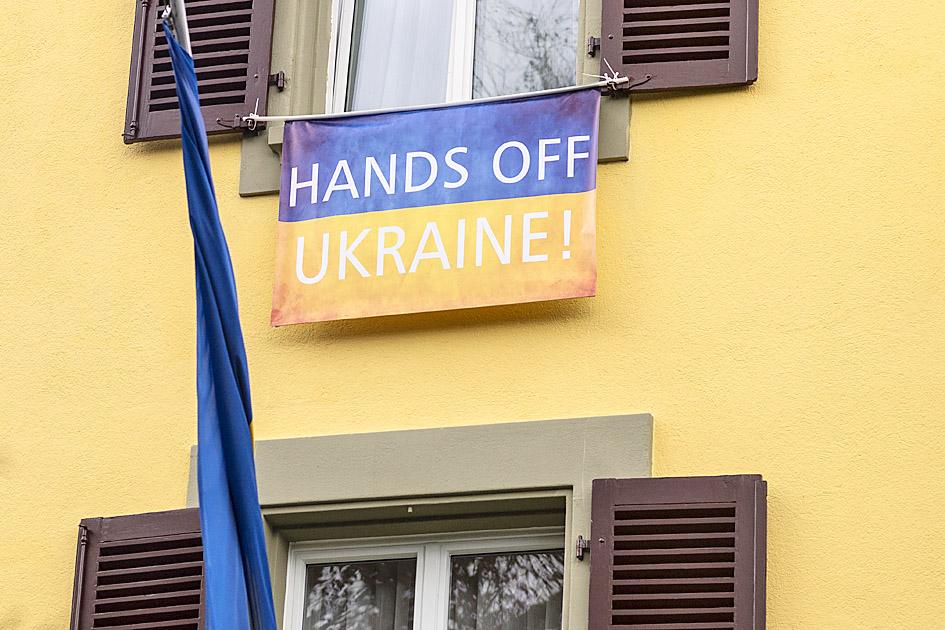With the smell of war in the air over Europe, world leaders got over the shock of Russian President Vladimir Putin’s order to deploy troops to separatist regions of eastern Ukraine and are focused on producing as forceful a reaction as possible.
Germany made the first big move, taking steps to halt the process of certifying the Nord Stream 2 gas pipeline from Russia.
The West insisted that Putin’s bold moves in Ukraine contravened countless international agreements and since words of diplomacy had failed, it was time to move toward action.

Photo: AP
“No lows too low, no lies too blatant, no red lines too red to cross,” Lithuanian Prime Minister Ingrida Simonyte said in summing up the political disgust felt from Europe to North America and democracies hugging Russia’s borders in Asia, such as Japan and South Korea.
Russia said that it is sending what it deems “peacekeepers” into eastern Ukraine, but EU High Representative for Foreign Affairs and Security Policy Josep Borrell said that they were “troops” on sovereign Ukrainian territory.
“I wouldn’t say that’s a fully fledged invasion, but Russian troops are on Ukrainian soil,” Borrell said.
The EU’s foreign ministers were to decide later yesterday on how deep a first batch of sanctions would have to cut.
It would likely stop far short of the “massive” package threatened by the EU and Washington for a full military invasion into national territory that Kyiv still controls.
“The way we respond will define us for the generations to come,” Simonyte said.
However, too much, too soon could also hurt the international response, Austrian Chancellor Karl Nehammer said.
A conflict could devastate Ukraine and cause huge economic damage across Europe, which is heavily dependent on Russian energy, but Asian nations are also worried.
South Korean President Moon Jae-in instructed his officials to prepare for the economic fallout if the Ukraine crisis worsens and US-backed nations levy stringent economic sanctions on Russia.
New Zealand Minister of Foreign Affairs Nanaia Mahuta said there was no basis under international law for Putin to recognize the Ukrainian separatist regions.
“We are concerned that this is a calculated act by President Putin to create a pretext for invasion, which would be a clear act of aggression. We again call for urgent diplomatic efforts to find a peaceful resolution,” Mahuta said in a statement.
Those on a saddle between Russia and the West were in an uncomfortable position.
NATO-member Turkey, which has close relations with Ukraine and Russia, criticized Moscow’s decision to recognize the independence of the regions in eastern Ukraine.
“We consider this decision by Russia as being unacceptable,” Turkish President Recep Tayyip Erdogan said. “We reiterate our calls to the parties to respect common sense and international law.”
Washington could be much more straightforward. The White House issued an executive order to restrict investment and trade in the separatist regions, and additional measures — likely sanctions — were to be announced later yesterday.
Those sanctions are independent of what Washington has prepared in the event of a Russian invasion, according to a senior administration official who briefed reporters on the condition of anonymity.

TRUST: The KMT said it respected the US’ timing and considerations, and hoped it would continue to honor its commitments to helping Taiwan bolster its defenses and deterrence US President Donald Trump is delaying a multibillion-dollar arms sale to Taiwan to ensure his visit to Beijing is successful, a New York Times report said. The weapons sales package has stalled in the US Department of State, the report said, citing US officials it did not identify. The White House has told agencies not to push forward ahead of Trump’s meeting with Chinese President Xi Jinping (習近平), it said. The two last month held a phone call to discuss trade and geopolitical flashpoints ahead of the summit. Xi raised the Taiwan issue and urged the US to handle arms sales to

A magnitude 5.6 earthquake struck off the coast of Yilan County at 12:37pm today, with clear shaking felt across much of northern Taiwan. There were no immediate reports of damage. The epicenter of the quake was 16.9km east-southeast of Yilan County Hall offshore at a depth of 66.8km, Central Weather Administration (CWA) data showed. The maximum intensity registered at a 4 in Yilan County’s Nanao Township (南澳) on Taiwan’s seven-tier scale. Other parts of Yilan, as well as certain areas of Hualien County, Taipei, New Taipei City, Taoyuan, Hsinchu County, Taichung and Miaoli County, recorded intensities of 3. Residents of Yilan County and Taipei received

Taiwan has secured another breakthrough in fruit exports, with jujubes, dragon fruit and lychees approved for shipment to the EU, the Ministry of Agriculture said yesterday. The Animal and Plant Health Inspection Agency on Thursday received formal notification of the approval from the EU, the ministry said, adding that the decision was expected to expand Taiwanese fruit producers’ access to high-end European markets. Taiwan exported 126 tonnes of lychees last year, valued at US$1.48 million, with Japan accounting for 102 tonnes. Other export destinations included New Zealand, Hong Kong, the US and Australia, ministry data showed. Jujube exports totaled 103 tonnes, valued at

BIG SPENDERS: Foreign investors bought the most Taiwan equities since 2005, signaling confidence that an AI boom would continue to benefit chipmakers Taiwan Semiconductor Manufacturing Co’s (TSMC, 台積電) market capitalization swelled to US$2 trillion for the first time following a 4.25 percent rally in its American depositary receipts (ADR) overnight, putting the world’s biggest contract chipmaker sixth on the list of the world’s biggest companies by market capitalization, just behind Amazon.com Inc. The site CompaniesMarketcap.com ranked TSMC ahead of Saudi Aramco and Meta Platforms Inc. The Taiwanese company’s ADRs on Tuesday surged to US$385.75 on the New York Stock Exchange, as strong demand for artificial intelligence (AI) applications led to chip supply constraints and boost revenue growth to record-breaking levels. Each TSMC ADR represents